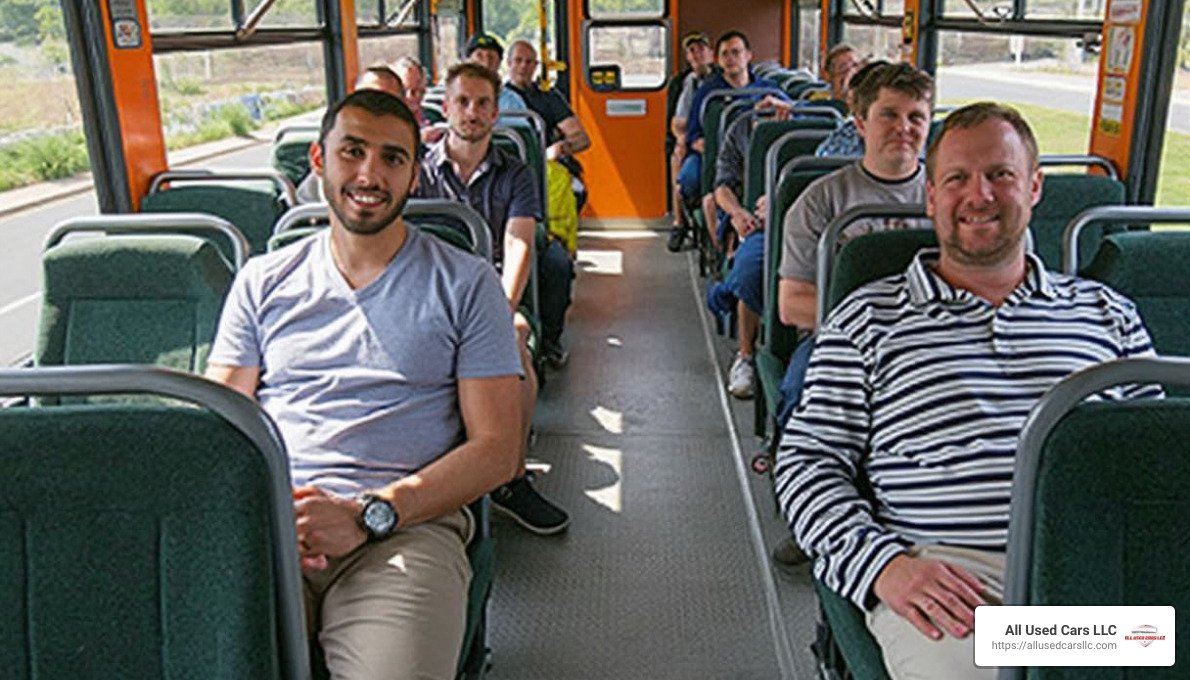
Coaster Bus Passenger Capacity: Top Facts Revealed 2024
Coaster bus passenger capacity is a key aspect that makes the Toyota Coaster a popular choice for businesses and organizations. If you’re curious about how many people this versatile minibus can accommodate, here’s the quick answer: The Toyota Coaster typically seats 28 to 30 passengers, making it a great option for group transport.
The Toyota Coaster is a well-known minibus that has been serving various transportation needs since its inception in 1969. Esteemed for its durability and reliability, the Coaster is custom to offer remarkable passenger capacity. Whether used in busy urban settings or serene rural areas, this single-decker minibus efficiently caters to groups by offering ample seating arrangements.
Toyota carefully designed the Coaster to balance between maximum passenger capacity and comfortable travel. Its various configurations can cater to schools, tour operators, and corporate businesses, each benefiting from the Coaster’s spacious interior and robust build.
Investing in a Toyota Coaster means choosing a vehicle that can handle substantial passenger loads while delivering comfort and safety—a combination essential for any responsible transport service.
Basic Coaster bus passenger capacity vocab:
Coaster Bus Passenger Capacity
The Toyota Coaster is a single-decker minibus, renowned for its ability to transport groups with ease and efficiency. With a seating capacity that typically ranges from 28 to 30 passengers, it stands out as an ideal choice for those who need reliable group transportation. This capacity includes the driver, making it perfect for schools, tour groups, and corporate shuttles.
The Coaster’s design focuses on maximizing space without compromising passenger comfort. Inside, the seating is arranged in a way that optimizes legroom and accessibility, ensuring passengers have a pleasant travel experience. The seats are usually organized in 8 to 9 rows, depending on the specific model and configuration. This layout not only accommodates a large number of passengers but also provides a sense of spaciousness.
For businesses and organizations, the Coaster offers a practical solution for transporting large groups efficiently. Its robust build and reliable performance make it a trustworthy option for long-term use. Whether navigating city streets or country roads, the Coaster’s passenger capacity and comfort make it a standout choice in the minibus category.
In summary, the Toyota Coaster’s ability to seat up to 30 passengers makes it a versatile and dependable vehicle for various transportation needs. Its thoughtful design ensures that both passengers and operators benefit from its spacious and efficient layout.
Variants and Specifications
The Toyota Coaster offers a range of variants and specifications to meet diverse transportation needs. Each variant is designed with specific features that cater to different preferences and requirements.
Engine Options
The Coaster is primarily known for its diesel engine options, which are favored for their durability and efficiency. The most common engine found in the Coaster is the 4.2-liter diesel engine, which provides a good balance of power and fuel economy. This engine produces 130 horsepower and 285 Nm of torque, ensuring reliable performance even when fully loaded.
In recent years, Toyota has introduced a more environmentally friendly option with the 1GD-FTV diesel engine. This engine offers 175 horsepower and 420 Nm of torque, providing improved performance and lower emissions compared to previous models.
Hybrid Models
Toyota has also ventured into hybrid technology with the Coaster lineup. The Coaster EV is an all-electric variant that boasts a 120kW motor and a range of up to 200km on a single charge. This model is equipped with a 47.5kWh lithium-ion battery pack, making it an ideal choice for short to medium-range trips with minimal environmental impact.
Payload Capacity
The Coaster is not only about passenger capacity but also about carrying cargo. It offers a payload capacity of up to 1860kg, making it suitable for transporting goods alongside passengers. This feature is particularly beneficial for businesses that require a versatile vehicle capable of handling various transportation demands.
The Coaster’s robust construction allows it to handle heavy loads while maintaining stability and comfort on the road. Its double-wishbone front suspension and leaf rear suspension systems improve ride quality, ensuring a smooth journey for both passengers and cargo.
In conclusion, the Toyota Coaster’s variants and specifications provide a wide array of options for different needs. Whether you prioritize fuel efficiency, environmental friendliness, or payload capacity, there’s a Coaster model that fits the bill.
Historical Evolution of the Toyota Coaster
The Toyota Coaster has undergone significant changes since its inception, evolving through four generations to meet the demands of various markets around the world.
First Generation (1969–1982)
The first generation of the Toyota Coaster was introduced in 1969. It was designed as a 17-passenger minibus, sharing its platform with the Toyota Dyna. The early models were powered by the 2.0-liter Toyota R engine, delivering 98 PS (72 kW) and paired with a 4-speed manual transmission. This generation set the foundation for the Coaster’s reputation as a reliable and efficient transport solution.
Second Generation (1982–1992)
The second generation arrived in 1982 with a complete redesign. This version featured a more powerful 4.0-liter engine, boosting its performance to 125 horsepower. The Coaster’s body was also revamped for a more modern look and improved aerodynamics. This generation solidified the Coaster’s standing in markets that required a robust and versatile minibus, such as schools and shuttle services.
Third Generation (1992–2016)
In 1992, the third-generation Coaster was launched. This iteration introduced a variety of engine options, including both diesel and petrol variants, to cater to different regional preferences. Notably, it included the 1HZ diesel engine, known for its durability and efficiency. This generation also saw the introduction of the Coaster Hybrid EV in 1997, marking Toyota’s first foray into hybrid technology before the popular Prius.
Fourth Generation (2016–Present)
The fourth generation Coaster was introduced in late 2016, showcasing a modern design with advanced safety features. It offered improved fuel efficiency and lower emissions with the introduction of the 1GD-FTV diesel engine, producing 175 horsepower. This generation continues to cater to diverse needs with variants like the Coaster EV, which supports environmentally conscious operations with its all-electric powertrain.
Throughout its history, the Toyota Coaster has adapted to changing market requirements while maintaining its core attributes of reliability and versatility. This evolution has enabled the Coaster to remain a popular choice for transportation across various sectors globally.
Frequently Asked Questions about Coaster Bus Passenger Capacity
How many seats does a Coaster bus have?
The Toyota Coaster is widely recognized for its ability to comfortably accommodate 29 passengers, including the driver. This makes it a popular choice for various group transportation needs, from school trips to corporate shuttles. The seating arrangement is typically organized in 8-9 rows, ensuring that there’s ample space for everyone on board.
What is the maximum passenger capacity of a Toyota Coaster?
The maximum passenger capacity of a Toyota Coaster can reach up to 30 passengers. This capacity is ideal for maximizing the use of space while still providing a comfortable ride for each passenger. The Coaster’s design allows for flexibility, so whether it’s configured for more legroom or additional seating, it can adapt to different requirements.
What are the dimensions of a Coaster bus?
Understanding the dimensions of the Coaster bus is crucial for planning its use, especially in urban and restricted spaces. The Coaster boasts a length of approximately 6,990 mm, a width of 2,275 mm, and a height of 2,635 mm. These dimensions contribute to its spacious interior, making it both a practical and comfortable choice for medium-sized groups.
The Toyota Coaster’s size and passenger capacity make it a versatile option for a variety of transportation needs. Its ability to balance capacity with comfort ensures that it remains a top choice in the minibus category.
Conclusion
At All Used Cars LLC, we understand the importance of finding the right vehicle to suit your needs, especially when it comes to accommodating a larger group. This is why we proudly offer the Toyota Coaster, a minibus known for its generous passenger capacity and reliability.
With the ability to seat up to 30 passengers, the Coaster is perfect for schools, companies, and tour operators looking for a dependable transportation solution. Its spacious interior, combined with a robust build, ensures that every journey is comfortable and safe.
When you choose to purchase a used Toyota Coaster from us, you’re not just getting a vehicle; you’re getting a promise of quality and competitive pricing. Our extensive dealer network across the USA ensures that we can offer the best prices and a wide selection of top-quality used vehicles. Plus, our secure financing options make it easier than ever to invest in a Coaster bus that fits your budget.
Explore our range of used Toyota Coaster buses today and find why so many trust All Used Cars LLC for their transportation needs. Visit our Toyota Coaster Bus page to learn more and find the perfect minibus for your requirements.



